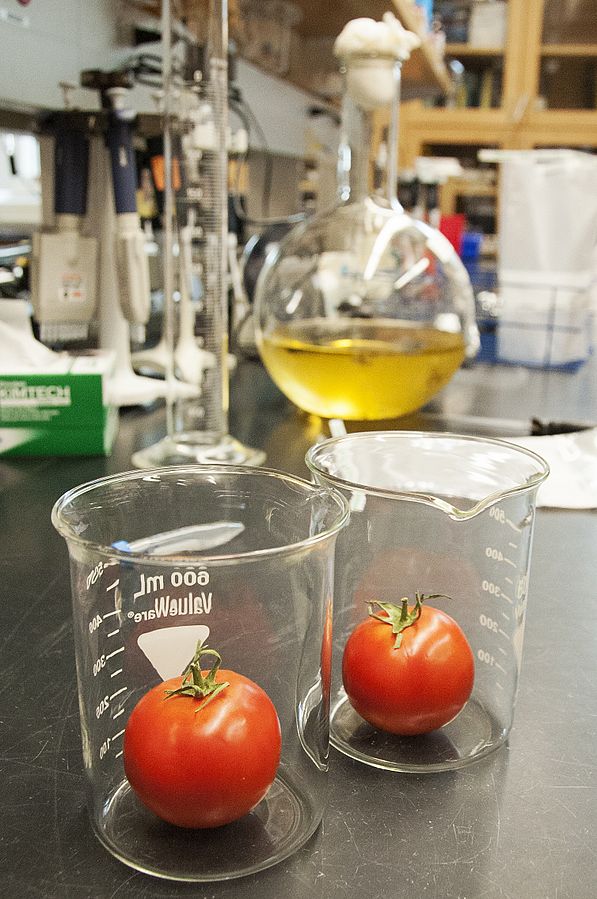Photo by CC user The U.S. Food and Drug Administration on Flickr
The food we eat has an impact not only on our bodies, but on the environment as well. As more people become aware of the potential negative consequences of certain foods and how they are produced, there is a growing movement toward plant-based cuisine. The increasing popularity of the veganism movement is another sign of this growing awareness of the processed food industry.
While many people want to move towards a more plant-based diet, it can be a challenge to find workable substitutes for certain foods or ingredients. Eggs, for example, are ubiquitous as a food as and also as an ingredient in nearly every processed product. Fortunately, scientific progress continues to make it easier to move from a potentially harmful diet to a a better food system based on plants, as it benefits people and the environment more than the status quo.
The Vital Field of Food Technology
Food technology is a field that falls under the larger umbrella of food science. Food technology scientists essentially study the production of food. While this originally started with finding preservation methods (e.g. canning, pasteurization, fermentation), the science has advanced to include things such as decaffeination, freeze-drying, and process optimization.
This scientific foundation of food technology has led to the current study of plant-based food. More research is being conducted on how to incorporate plant-based food into the mainstream, and even create plant-based substitutes for certain ingredients such as eggs. The goal of this research is to create a food production system that is more sustainable and healthier for people and the planet.
A Revolutionary Egg Substitute
One of the first projects food technology company Hampton Creek took on was to find an inexpensive plant-based egg substitute that had the same taste and texture as eggs. After research and development, their first product, Beyond Eggs was released in 2013. It’s an egg substitute that is completely eggs-free and is derived from peas, among other things. Although it’s no longer marketed to the public, the product is used as an ingredient in other egg-free foods.
In fact, according to Hampton Creek the cost for producing this egg substitute is actually 43 percent most cost effective than the production of traditional eggs. Following the release of Beyond Eggs, the company released Just Mayo, an egg-free mayonnaise using Beyond Eggs as an ingredient. The mayo comes in several different flavors. The company has successfully created and marketed other products using the egg substitute, including Just Cookie Dough, an egg-free cookie dough that can be baked or eaten raw with none of the risks associated with eating raw eggs.
Science is the foundation that makes these plant-based products so successful. By studying the molecular structure of plants, researchers are able to find certain plants that can be used or manipulated into substitutes for other mainstream foods. According to Hampton Creek, the goal of this research isn’t necessarily to replace traditional eggs or mayonnaise. It’s to improve the food production system as a whole, finding more effective and less costly ways to make food on a large scale.
Using technology, food scientists hope to a create ways to make food that is healthier and cheaper, and that has less of an impact on the environment. Because there are so many varieties of plants all over the world that haven’t been extensively studied, there is hope that more research will yield other ways that plants can be used to make better, cheaper food. In fact, the success of Hampton Creek in creating a delicious plant based mayo has led other large food production companies to start their own research into vegan substitutes for traditional foods.
A Database of Plants
To further research, in 2014 Hampton Creek started working on cataloguing their extensive plant research into a helpful database. The company hired a professional from Google to help build the plant database and the technology has advanced beyond simply cataloguing plants to studying the biological data using deep machine learning. The ultimate goal of the company in creating this database is to learn more about plants all over the world and help farmers find cash crops beyond soy and corn that are actually good for the environment. This should lead to a food production system that is more efficient and cost-effective.
Results of Scientific Research
Science and technology have made substantial marks on the food production system. While there are still some areas of the food system that need improvement, the research performed by food scientists is making strides. Consumer support for vegan, plant-based products helps support such research, and brings greater awareness to the overarching goal of creating a more effective, healthy, and sustainable food production system.
